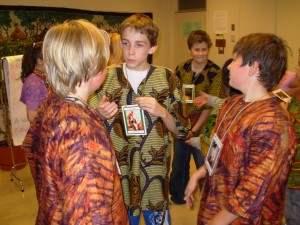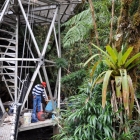West Africa Alive: A Simulation of an International Land-use Conflict
Completion Date: Mar 01, 2009
- Produced with the support of the Government of Canada through the Canadian International Development Agency (CIDA), Global Classroom Initiative
- BC School District 54
- Helene Fleury (teacher and environmental educator)
- Ibrahim (Benji) Kamara (cultural consultant)
Kristin Patten
Helene Fleury helenefleury@bulkley.net
Through an experiential learning process using role-play, scenarios and various activities, this classroom-based project brings to life a West African village. The village is created in the class by introducing dress, music and other props and by assigning characters. Each student is given a character representing a different stakeholder, including harvesters, farmers, loggers, hunters, youth and the Chief and elders. Various activities lead the students through the scenario, deepening their understanding of environmental issues in West Africa, different ways of making decisions about land-use and potential solutions that improve livelihoods while ensuring sustainability of natural resources. The scenario posed is modeled after real-life development challenges in West Africa - and makes links to the challenges we face here in Canada. West Africa Alive visited over 20 classrooms in BC’s northwest to facilitate the day-long scenario - with rave reviews from teachers and students alike!
You Tube video:
Teachers - download the West Africa Alive activity kit here!
You can also download and print character card photos for youth, chief and elders, photos for harvesters, loggers, hunters and farmers and text for the back of the cards. Each student is given a character and accompanying character card at the beginning of the day. Students stay in ‘role’ as their character throughout the day.
The kit includes instructions for each activity as well as student handouts so teachers can replicate West Africa Alive in their classrooms. The activity kit is free; if you do use the activities in your classroom, please send us your comments and feedback. The activities in the kit have also been designed to meet many of the BC Ministry of Education’s Prescribed Learning Outcomes for Grade 6 students - click here for the Learning Outcomes addressed by the activities.
What students are saying:
“The most surprising thing I learned today was how hard it is being an elder and making big decisions.”
“My character’s name was Neneh Pallo, and I was a harvester. I harvested in the forest and held a basket on top of my head. Me and my fellow harvesters waked miles until we reached the town and we put our fruit in the market. I liked it when we danced and when we discussed.”
“My character made me feel like it was a serious agreement and a real matter...what I liked the most about today was dancing and learning about different villagers. I would like to know more about African villages.”
What teachers are saying:
“Role playing helped the students to identify strongly with the needs of a variety of groups in the community...[West Africa Alive] helped them understand the complexity of land use and how passionately people react to different development options.”
“The day engaged the students in problem-solving activities and raised their awareness on local environmental issues. Very well done!”
Divided in three sections, the project begins with a pre-presentation where students will be asked to prepare for the classroom simulation by answering what they know, what they wonder and what they worry about Africa. On the simulation day, trained facilitators from West Africa Alive came into the classroom for a day of direct experiences including setting up of the village as well as facilitation of activities. The created village setting helped students envision the immediate environment in West Africa – farms, water sources, forests, etc. Students start by engaging with each other in their characters and learning about their village, through an enacted drama and a Reader’s Theatre activity. They then explore the impacts of a proposed development scenario on different stakeholders in their village and potential solutions to their environmental challenge. Facilitators guide the exploration using a variety of instructional method. The class will be asked to collaborate to ‘design’ a land-use plan that addresses the environmental challenge, considering the needs of different villagers and their environment. They are introduced to issues of power and decision-making through the simulation. A wrap-up slide show gives examples of actual examples of Canadian organizations implementing projects in West Africa, in partnership with local organizations.
Follow-up activities are left with the teacher including reflection activities to conclude the learning process and additional activities for continued learning opportunities.
Objectives of this project:
• Foster a sense of global citizenship, global responsibility and environmental literacy ;
• Increase awareness of Canada’s responsibility in an interdependent world
• Develop awareness, knowledge of international development cooperation issues and how Canadian organizations and CIDA are working in West Africa while also leading students to action ;
• Better understand the relationship between human rights, justice, race and gender equity and the environment ;
• Examine the origins and impacts of the students’ present world view ;
• Provide experiential learning opportunities for students to explore the environmental impact of decisions and actions made at personal, community, societal and global levels ;
• Develop the ability to work co-operatively.



